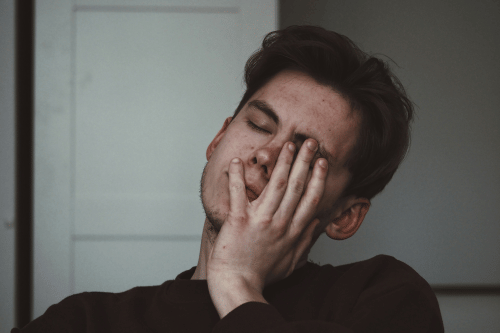Idaho, Iowa, Des Moines

“Unmasking” has become a buzzword in ADHD and autism spaces. On TikTok or Instagram, it’s often painted as the ultimate goal: rip off the mask, live fully authentically, and then all your problems will simply vanish into thin air. The reality is never that convenient, though.
Taking the mask off comes with risks that can impair your career, your relationships, and even your sense of safety. Unmasking isn’t always an option, and it definitely isn’t all-or-nothing. Even if you want to completely unmask, your nervous system may need a lot of time and care to feel safe with it.
Here’s why masking can feel safer than unmasking, how you can live in the grey areas in-between, and why authenticity isn’t defined by any single way of showing up.
If you’ve pathologized your masking because of the pressure to be authentic, you’re not alone. Popular or trending ideas around what neurodivergence should look like have emerged more heavily in social media lately, but they gloss over nuanced and complex issues. The message that “good” neurodivergent people unmask everywhere is a loud and constant oversimplification, and implies that anyone who isn’t doing those things is failing.
Being 100% authentic all the time can just become one more “should” you throw at yourself. Masking is a survival tool. Your brain doesn’t care about whether a coping skill is convenient or enjoyable or even effective all the time; it just cares that it will help you stay alive. Sometimes masking is the best, safest, or only choice. So if you find yourself masking at work or with family, that’s okay. It doesn’t erase your neurodivergence, your personality, your identity, or your worth. It just means you’re navigating a world that can’t and won’t always support your needs.

Unmasking can feel like the epitome of being yourself, but it’s not always appropriate or beneficial. Weighing the risks and deciding if a situation feels safe enough means that sometimes it won’t be.
Here are seven common reasons you might choose to continue masking:
Existing as a neurodivergent human in a neurotypical world can be traumatizing. Extra levels of sensory and emotional sensitivity, a constant influx of messages that there’s something innately wrong about you, feeling like your brain just doesn’t work the way it should… all of that leads to shame and identity loss and lowered self-worth. It also leads to living in survival mode, where your nervous system is constantly ringing the alarm bells and coding every environment you’re in as potentially unsafe. Until you work with your nervous system to increase a felt sense of safety, unmasking can feel too overwhelming.
Disclosing ADHD or autism can lead to subtle or overt discrimination. That can look like being passed over for promotions, people making comments about your “attitude” or “work ethic,” or being shunned by coworkers.
Not every family is supportive or informed about neurodivergence. Some might minimize, shame, or dismiss your experiences. In those environments, unmasking can feel more painful than helpful.
Friends, partners, or other loved ones might not understand your needs or the way your brain works. Sometimes people pull away or judge, especially if they’ve only known the masked version of you. This can be super painful, especially if it tugs at old abandonment wounds and ramps up your people-pleasing tendencies, and can keep you in cycles of masking to avoid losing those people.
If you’re queer, trans, or BIPOC, the risks of unmasking stack up. It can mean exposing yourself to multiple layers of prejudice and misunderstanding, often with real and horrific violence attached. Racial or queer stereotypes can be compounded by biases about neurodivergence, and those colliding differences might increase your risk of being excluded, targeted, or violated.
In spaces where you don’t hold much power – a new job, a medical appointment, a classroom, at work – you may not feel safe being fully authentic. The experience of being around people who behave like they have more power than you is intimidating enough on its own. Adding unmasking to the mix can put you at risk of things like medical neglect, financial hardship, or job loss. While these situations are illegal in theory, they still occur in everyday life.
While external risks can and do pose a real threat, your desire or readiness to unmask depends more on how internally resourced and resilient you feel. Your capacity isn’t endless, and everyday changes in mood or conflicts limit your ability to unmask. If you’re already exhausted, stressed, or burned out, unmasking might feel like too much to handle. And if you haven’t built up coping strategies to support your authentic self, you may not feel ready or safe enough to unmask at all.

It can seem like there are only two extremes: unmask entirely or disappear behind the mask. Be completely authentic or hide.
That black-and-white narrative is common and makes sense, but it can be more helpful to reframe unmasking as a partial or nuanced behavior that can exist in grey areas.
When you have to choose between authenticity and hiding, it keeps your nervous system dysregulated and afraid. Masking can feel like a requirement placed on you by the rest of the world – and of course, in so many ways, it is – but ultimately, you’re the one responsible for choosing when and where and how you mask or unmask. Choice gives you a sense of agency, and agency is accompanied by authenticity. Being authentic doesn’t hinge on whether you’re masked or unmasked; it’s possible in both, and in the spaces in between.
You don’t need to unmask perfectly or all the time. You can unmask partially, and that’s totally okay. That can look like going braless and wearing only tagless pajamas at home, but wearing the types of clothes that other people wear when you’re at work. It might mean asking a close friend to come over and stare at a wall in silence with you, but keeping up with conversations at a party. It could be using scripts when talking to strangers, but dropping them with trusted loved ones.
You get to choose what feels right and comfortable for you.
If you want a space to experiment with unmasking, therapy can help. In sessions, you get to explore what authenticity feels like in your body, without the risks that come with unmasking with work, family, or relationships. It’s like a safe science laboratory for your mental health.
I’m a coach and therapist for millennial professionals with anxiety and neurodivergence who want to find more balance in their lives. I’m here to remind you that you’re good enough as you are, no matter what. If you can’t take my word for it and want to learn how to feel good enough, too, I’ll help you…
Book a free consultation with me right here and let’s see if we’re a good fit. You’ve got this, and I’m in your corner.
Danielle is an anxiety therapist and perfectionism coach. She specializes in helping busy millennials dial down their anxiety and ADHD, so they can perform at their best. Danielle has been featured on Apartment Therapy, SparkPeople, Lifewire, and Now Art World. When Danielle isn't helping her clients, she's playing video games or spending time with her partner and step children.


